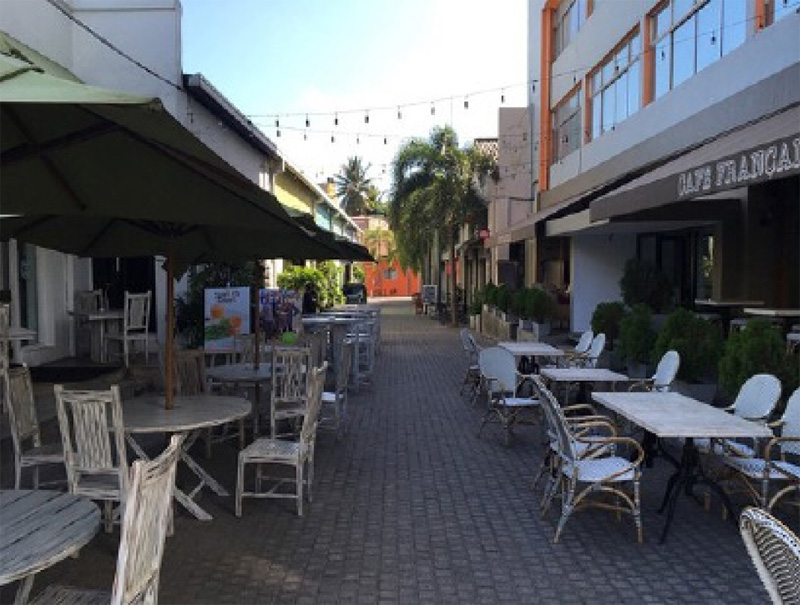Tuesday Feb 24, 2026
Tuesday Feb 24, 2026
Monday, 31 May 2021 04:03 - - {{hitsCtrl.values.hits}}

Emphasising they are the ‘forgotten stakeholders’ of the tourism industry, restaurants and bars are seeking urgent relief as the COVID-19 pandemic and resultant travel restrictions have seriously impacted their businesses.
The Colombo City Restaurateurs Collective (CCRC) on behalf of its 56-strong membership said the industry was severely impacted by the three waves of the pandemic which followed soon after the 2019 Easter Sunday terror attack.
“We are undergoing an unprecedented financial crisis that threatens to cause the total collapse of the industry that, would result in the loss of billions of rupees invested in it, cause massive job losses and a loss of a substantial amount of revenue to the Government and damage the tourism industry immensely,” CCRC said in a statement.
To avert this potentially disastrous eventuality CCRC has urged the Government to offer a relief package for the restaurant and bar industry.
The seven important relief sought are:
1. Provide working capital loans from State banks at the same rate of 4% that was offered to the hotel industry last year with movable property considered as collateral.
2. Extension of the moratorium on existing debt until end of 2022.
3. Provide relief from utility bill payments for the months of April, May and June, and allow those cumulative rates to be paid off in equal instalments along with the rates of the July-December period.
4. Exemption from Excise Licence fees for the full period that restaurants are not allowed to serve alcohol to customers.
5. Allow the sale of alcoholic beverages to all dine-in customers in restaurants as currently allowed in tourist hotels as soon as lockdown restrictions are lifted on 7 June.
5. Wave off penalties on all outstanding statutory payments.
6. Abolish TDL and Municipality Tax for the current financial year.
7. Introduce a priority vaccination program for all front-line food and beverage service personnel in order to instil a sense of safety in customers about patronising restaurants.
CCRC said most of these measures had already been proposed by other representative bodies from the tourism industry, such as THASL and the CCRC, and respectfully requested due recognition and consideration for the restaurant and bar industry as an integral part of the tourism industry that deserves equity in the granting of any relief in the future.
The CCRC statement also said the restaurant and bar industry in Sri Lanka, like in other parts of the world, was a much-favoured segment of the hospitality and entertainment industry amongst foreign and local travellers. It added much-needed diversity and vibrancy to the travel and tourism industry of Sri Lanka and provides direct and indirect employment and livelihoods to many hundreds of thousands of the population.
These restaurants and bars are duly formally established businesses that are registered and regulated by all relevant local and central government level agencies and authorities providing a substantial amount of revenue to the coffers of these bodies annually.
However, when it comes to formulating policies, the development of the tourism industry or providing relief measures during times of difficulty such as the situation faced today the restaurant and bar industry has often been given scant regard or consideration for many years.
That could be a result of this industry has traditionally and predominantly been an independent entrepreneur's domain and not been operated by big local or multinational corporations that get represented and therefore, often wield influence at the highest levels of policy and decision-making for the tourism industry.
This has been amply reflected in the recent past when relief measures proposed by the Ministry of Tourism and formulated and introduced by the Government to mitigate the downturn in the tourism industry due to the COVID 19 pandemic.
For example, a major thrust of those measures proposed was in the form of low-interest working capital loans aimed at assisting tourism-related operations financially to meet their most urgent requirements and avoid the total collapse of the business.
Thanks to that policy, many hotels, guest houses and hostels that own assets that are acceptable to the banking industry as collateral were able to obtain such financial assistance and sustain their businesses.
However, the restaurant and bar industry even though they are approved and duly recognised by the SLTDA and pay 1% of their total revenue annually to the industry's coffers were by and largely unable to obtain this benefit measure due to the great majority of them not owning the premises they operate out of and there being unable to provide Class A collateral demanded by the banks.
The Colombo City Restaurateurs Collective (CCRC) on behalf of its 56-strong membership made repeated requests to the relevant authorities to accept the many state-of-the-art catering equipment owned by the member restaurants as collateral but those requests were repeatedly ignored denied.
As the sole representative body for the restaurant and bar industry in the country, Colombo City Restaurateurs Collective (CCRC) emphasised that the measures proposed above were critical to the survival of the industry and the many livelihoods depend upon it and that the relevant authorities should take note of the unique characteristics of this industry which had been denied full benefit from previously introduced relief measures for the hospitality industry and give it special consideration when formulating such policies in the future.
